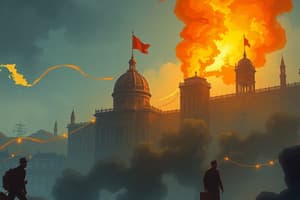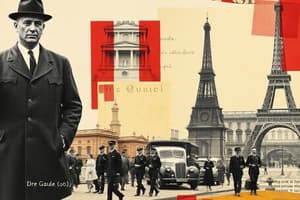Podcast
Questions and Answers
What was the main point of contention among the allies regarding Germany after World War II?
What was the main point of contention among the allies regarding Germany after World War II?
- The division of Germany into zones
- The type of government to establish in Germany
- The rebuilding of German infrastructure
- The amount of reparations to impose on Germany (correct)
What was the Soviet Union's vision for German reparations?
What was the Soviet Union's vision for German reparations?
- To dismantle German factories and secure large quantities of reparation from the Western zones (correct)
- To integrate Germany into the Western European liberal economy
- To create a common currency for all of Germany
- To impose heavy reparations on the Western zones
Why did the American perspective prevail in the discussion on German reparations?
Why did the American perspective prevail in the discussion on German reparations?
- Because the Western European economy was dependent on German production of coals and steel
- Because not investing in German recovery would risk delaying European recovery (correct)
- Because the Soviet Union refused to participate in the Marshall Plan
- Because the United States wanted to impose heavy reparations on Germany
What was the goal of the United States in integrating the Western parts of Germany into the Western European liberal economy?
What was the goal of the United States in integrating the Western parts of Germany into the Western European liberal economy?
What event in 1948 led to the Soviet Union leaving the Allied Control Council?
What event in 1948 led to the Soviet Union leaving the Allied Control Council?
What was the response of the Western allies to the Soviet Union's blockade of West Berlin?
What was the response of the Western allies to the Soviet Union's blockade of West Berlin?
What was the reason for the Soviet Union's blockade of West Berlin?
What was the reason for the Soviet Union's blockade of West Berlin?
What was the consequence of the Soviet Union's blockade of West Berlin?
What was the consequence of the Soviet Union's blockade of West Berlin?
What was one of the main aims of the Allied powers at the Versailles Treaty?
What was one of the main aims of the Allied powers at the Versailles Treaty?
What was the main consequence for Germany after World War I?
What was the main consequence for Germany after World War I?
What was the purpose of the Sykes-Picot Agreement?
What was the purpose of the Sykes-Picot Agreement?
What was the outcome of the Arab revolt sparked by Thomas E. Lawrence?
What was the outcome of the Arab revolt sparked by Thomas E. Lawrence?
What was one of the significant consequences of the Treaty of Versailles?
What was one of the significant consequences of the Treaty of Versailles?
What was a significant event that occurred before the official beginning of World War II?
What was a significant event that occurred before the official beginning of World War II?
What was the main territorial cost of the Brest-Litovsk Treaty for Soviet Russia?
What was the main territorial cost of the Brest-Litovsk Treaty for Soviet Russia?
What was the main goal of the League of Nations established by the Treaty of Versailles?
What was the main goal of the League of Nations established by the Treaty of Versailles?
Why did Lenin travel through Germany in 1917 despite the countries being at war?
Why did Lenin travel through Germany in 1917 despite the countries being at war?
What was the main reason behind the Bolsheviks' decision to overthrow the provisional government in October 1917?
What was the main reason behind the Bolsheviks' decision to overthrow the provisional government in October 1917?
What was the main consequence of the Brest-Litovsk Treaty on the war effort?
What was the main consequence of the Brest-Litovsk Treaty on the war effort?
What was the main criticism of the wealthy and powerful by the revolutionaries?
What was the main criticism of the wealthy and powerful by the revolutionaries?
What was the main outcome of the Paris Peace Conference in 1919?
What was the main outcome of the Paris Peace Conference in 1919?
What was the significance of the year 1922 in the context of the Russian Revolution?
What was the significance of the year 1922 in the context of the Russian Revolution?
Flashcards are hidden until you start studying
Study Notes
Reparations and European Recovery
- The Allied powers disagreed on reparations, with the Soviet Union wanting heavy reparations from Germany, while the Western allies prioritized German recovery.
- The Soviet Union sought to dismantle German factories and secure large quantities of reparations from the Western zones.
- However, Western Europe was dependent on German coal and steel production.
American Perspective and the Marshall Plan
- The American perspective prevailed, recognizing that not investing in German recovery would delay European recovery.
- By 1947, unification of the four zones was no longer an option, and the goal was to integrate the three Western zones into the Western European liberal economy (ERP).
Conference and Berlin Blockade
- In February 1948, a conference was held to merge the three Western zones into a newly established West German State, part of the Marshall Plan.
- The Soviet Union was not invited, leading to their departure from the Allied Control Council.
- In June 1948, the Soviet Union blockaded West Berlin, which was surrounded by the Soviet-occupied part of Germany.
- The Western allies responded with an airlift, continuously flying in supplies to West Berlin.
Post-WWII Territory Changes
- Germany was divided into four parts, with three zones occupied by the Western allies and one by the Soviet Union.
- Germany lost territory in the East, while the Soviet Union (Russia) also lost territory compared to before the war.
Sykes-Picot Agreement
- The Sykes-Picot Agreement (May 1916) was a secret deal between the UK and France to divide the Ottoman Empire's territories.
- The agreement aimed to create an Arab homeland and led to the British and French dividing Arab territories between themselves.
World War II and the Cold War
- The Bolsheviks, led by Lenin, overthrew the provisional government in October 1917.
- The Soviet government signed the Brest-Litovsk Treaty in March 1918, ending the war in the East and allowing Germany and Austria-Hungary to focus on the Western front.
Russian Revolution and Treaty of Versailles
- The Russian Revolution was driven by the idea that people were sacrificing their lives for wars ruled by wealthy kings and generals who never joined the battle.
- This revolutionary idea was strong in Russia and spread to other countries.
- Lenin traveled through Germany, despite being at war, and returned to Russia in April 1917.
- The Treaty of Versailles (June 28, 1919) established the League of Nations, which aimed to settle disputes through debate rather than war but was ultimately ineffective.
Studying That Suits You
Use AI to generate personalized quizzes and flashcards to suit your learning preferences.




